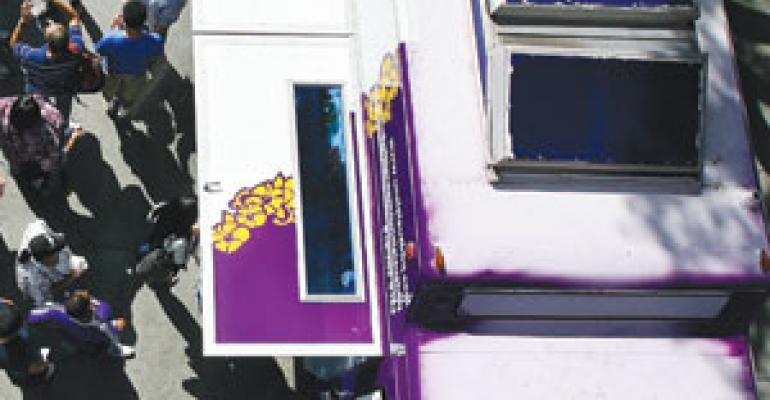The Los Angeles County Department of Public Health on Tuesday called for a revision of the county’s restaurant inspection ordinance to require food trucks to post letter grades like brick-and-mortar operations must do.
The county Board of Supervisors reportedly is not expected to vote on the proposal until next week, but it has the support of food truck operators, who say the move would further legitimize their niche within the foodservice industry.
“We want recognition that we jump through the same hoops that restaurant operators do,” said Matt Geller, chief executive of the Southern California Mobile Food Vendor Association, representing about 88 truck operators. “There are all these myths about food trucks operating outside the law.”
The food truck movement continues to grow throughout the Los Angeles area, with an estimated 6,000 full-service catering trucks on the streets offering everything from Korean tacos to fried chicken balls, as well as 3,500 hot dog, churro or other food carts, according to county estimates.
In a letter to county supervisors Tuesday, Dr. Jonathan Fielding, director of the Department of Public Health, said that posting letter grades — which reflect an operation’s score on its most recent inspection — will help the public know which trucks are permitted and routinely inspected and which are not.
Food trucks currently are required to undergo annual inspections. However, unlike brick-and-mortar foodservice operations, the trucks are not required to post any results.
Under the proposal, food trucks would be inspected twice annually, which Fielding contends will improve safe food handling and practices, and ensure that the trucks are following state safety codes.
John Bowler, owner of the Barbie’s Q food truck in the Los Angeles area, said, “I think it’s a great idea and it’s going to demonstrate that these trucks are indeed as clean as restaurants and eliminate the concerns by restaurants that we’re not as regulated as they are.”
Bowler said two inspections per year would be an improvement over the four or five inspections his truck has had so far this year. Truck operators often must go through additional inspections to participate in festivals throughout the region, he said, or inspections by various health departments as they cross county lines.
The proposal also would require truck operators to keep health officials informed of where they plan to be at all times, to allow for surprise inspections.
Geller said most truck operators post their whereabouts on Twitter and online, making such schedules readily available.
If approved by the county board of supervisors, the proposal would take effect 30 days later.
Initially, it would only be enforceable in unincorporated areas of the county. As with the letter grade program, however, Fielding said it is anticipated that the 88 incorporated cities within Los Angeles County also would adopt the ordinance.
Contact Lisa Jennings at [email protected]

